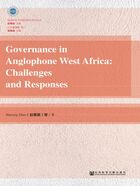
1.3.2 Machinery of Government
At the top of the machinery of the government in The Gambia has an executive president who is both the head of state and head of government and also the commander-in-chief of the Gambian armed forces. Legislative power is vested in Parliament of the country. The office of the president is established under Chapter Part I and II of the 1996 Constitution of the Gambia. Constitutionally, the president appoints the vice president and all secretaries of the state. The secretaries of state are not supposed to be members of the National Assembly. The president makes these appointments in consultation with other specified organs of the state, but their approval is not binding. Other key public officials such as Service Chief, Judges, Ombudsman, Central Bank Board of Directors, Directors of Prosecutions and Auditor General are appointed by the president. The constitutional arrangement that allows the president to appoint key state officials shows the executive-centered nature of public administration in the country.
The National Assembly is made up of fifty-three members of which forty-eight are elected directly from the chieftaincy districts and the other five appointed by the president. The members of the National Assembly hold office for a period of five years. The National Assembly perform two main functions and these include; representation of the various interest groups and geographical representation. The Constitution of the Gambia also made provision for the establishment of standing committees of the house which include the Public Appointment Standing Committee, Finance and Public Accounts, Privileges, and Defense and Security.
The Gambia has tripartite legal system which is based on statute law/English common law, Sharia (Islamic law), and customary law. The court system comprises the superior courts of record (High Court, Court of Appeals, and the Supreme Court) and a subordinate court system comprising magistrate’s courts and specialized tribunals.The judicial infrastructure and access to the courts in the rural areas are considered poor compared to urban areas.
For effective performance of public administration, the Gambia has two agencies-the Personnel Management Office (PMO) and the Public Service Commission (PSC). The PMO focuses more on strategic and regulatory roles, dealing with human resource management policies and strategies. The PSC currently focuses on conducting interviews for appointments and approving recommendations for promotions. The PSC seeks to ensure an effective and efficient Civil Service by ensuring that citizens who meet the criteria or jobs are recruited, trained, and disciplined in an open, fair and impartial manner. The Commission is supposed to provide efficient and cost-effective service for all Civil Servants and other stakeholders.